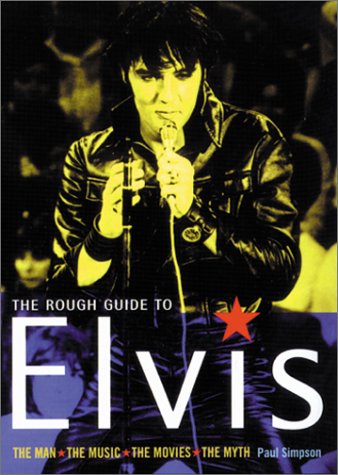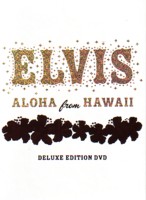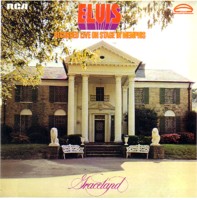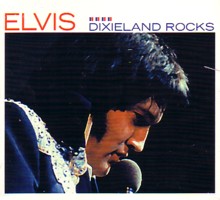Author
of "Rough Guide to Elvis" talks to EIN
|
'The
Rough Guide to Elvis' by Paul Simpson was first published
in 2002 and immediately became one of the most fascinating
& readable compendiums to everything Elvis.
Packed
full of interesting information and thoughtful insights,
it was a perfect pocket-sized companion to my train,
plane & bus journeys since there was always something
new to explore.
The
updated 2004 version will be released in Australia in
November.
Author
Paul Simpson took time out to explain to EIN why a book
about a guy who died 27 years ago actually needs to
be updated!
|
 |
EIN
– Paul, it is indeed a pleasure to talk with you again. It
is incredible that Elvis’ musical legacy still continues to
grow 27 years after his death. What inspired this updated
Rough Guide?
PS
- Inspired may not be the word – but it was timed to precede
the 70th anniversary of Elvis’s birth. And after the first
edition, there were a few things which needed correcting and
a slew of new releases to be sifted through.
EIN
– What is specifically new in the updated Rough Guide, and
does it feature more about the new DVDS as well as the FTD
fan club releases?
PS
- Without wanting to stop anyone buying it, I’ll be honest
and say that it’s a modest retread, not a complete makeover!
It does point people to the best of the new releases, including
some of the gems on FTD. After the first book came out, I
also realised that I hadn’t specifically focused on Gladys
at any point which, given her importance in Elvis’s life,
seemed a remarkable, if not downright stupid, omission, so
this gave me a chance to put that right.
EIN
– Since the first Rough Guide "Elvis 30 #1s" has become Elvis’
biggest selling album of all-time. Do you think this helped
re-establish his credibility amongst the new generation?
PS
- Yes, it made his genius instantly accessible and was probably
the best single, to the point, compilation of his greatest
work. The follow-up 2nd To None didn’t, somehow, seem as essential.
It smacked of the bad old RCA of the 1970s, feeling more like
an exercise in cheap exploitation than a release which really
served a purpose. If they’d wanted to release something that
showed off the less known side of his talent, I would have
suggested including gems like Tomorrow Is A Long Time, Whole
Lotta Shakin’ Goin On, I’m Leaving… and sparing us the bonus
of a snippet of the Roustabout theme.
EIN
– So did you feel the same about the ‘Rubberneckin’ follow
up to ‘A Little Less Conversation’ remix? It obviously put
Elvis back onto the dance-floors, don’t you think that this
concept should continue?
PS
- Rubberneckin' obviously didn’t sell as well but then it
wasn’t on a Nike advert, so maybe it was never going to. I
preferred A Little Less Conversation – I think Elvis would
have quite liked it (he was always trying to get his voice
set back in the mix). However I did hear Rubberneckin on a
lot of radio stations, and a lot of late-night shows, which
wouldn’t have played Elvis normally so maybe it did its job.
As for other variations on the theme, I don’t know. The first
two worked quite well because they were a little obscure –
I’m not sure a remix of Heartbreak Hotel would have clicked
in the same way. I was more excited by the re-release of That’s
All Right.
EIN
– Since the first Elvis Rough Guide BMG have released multiple
Elvis CDs for the public including box-sets ‘Today, Tomorrow
and Forever’ and ‘Close Up’, as well as ‘Ultimate Gospel’
and the amazing ‘Elvis At Sun’. Does the new book discuss
these releases and what were your favourites over the past
2 years?
PS
- Yes, the book does discuss those – although, on Elvis At
Sun, I find myself among the traditionalists who prefer Sunrise.
My favourite release of the moment is probably So High, from
an often overlooked part of the King’s career, when he was
trying to get tings clicking again in the studio. Today Tomorrow
and Forever is a tough one – does the world really need another
version of The Love Machine?
EIN
– So do you think that BMG/RCA is still oversaturating the
market place with Elvis product?
PS
- Not really. I’m praying for a definitive box set/compilation
of the Memphis sessions and the 1968 special – you know, all
the stuff that’s available separately in one place. The Memphis
sessions in particular would benefit from this – it must be
almost possible to release a complete record of those amazing
sessions; after all, if Peter Guralnick has listened to 23
takes of In the Ghetto, why can’t the rest of us?
EIN
– The sound of ‘Elvis At Sun’ was exceptional and seemed to
defy logic seeing as the songs were 50 years old. I always
found previous Sun compilations, including Sunrise, a little
(audibly) unbalanced but this seemed the defining Elvis CD.
Now we discover how much RCA messed with the originals. What’s
your opinion - Did you get goosebumps listening to these new
versions?
PS
- I know what you mean, although for me Sunrise redressed
some of that imbalance. I remain slightly sceptical about
such technological revisionism although they do sound great.
The big downer, for me, about Elvis At Sun is the paucity
of tracks.
EIN
– While ‘That’s All Right’ might not have been the first rock
‘n’ roll record (the 1951 ‘Rocket 88’ does it for me) there
seems little doubt that Elvis was the first rock ‘n’ roll
artist to break down the doors of boring middle-america. Do
you think this ‘50th Anniversary of the Birth Of Rock ‘n’
Roll’ was genuine this year or was it just a great marketing
ploy?
PS
- Like all great marketing ploys, the 50th anniversary was
based on a genuine event. I know musicologists argue over
the evolution of rock and roll but, to me, there is no scintilla
of doubt that, without Elvis, rock would have not have been
the force it became. Everyone – Chuck Berry, Little Richard,
Bob Dylan – have said as much but a few critics still like
to ignore the fact.
EIN
– What do you think was the first rock ‘n’ Roll record?
PS
- Rocket 88 is as good a shout as any, but you only have to
listen to the work of Joe Turner or even Louis Jordan to realise
that rock and roll was as much evolution as revolution. Music
history is written as if one man – normally Sam Phillips –
invented rock ‘n’ roll but I think it was more of a collaborative
effort. Like the scientists at Los Alamos who combined to
invent the a-bomb, although, in rock and roll’s case, the
collaboration was loose, and unofficial, and between artists,
producers and writers in different parts of America.
EIN
– The 5 channel Audio DVD of ‘Elvis’ 30#1s’ also came out
after the first book. The American Studio’s tracks (In The
Ghetto etc) were an audiophile’s dream – Do you think that
all of Elvis’ 1969 material should be released in this format
or was the original concept so strong that hearing them in
mono should be enough?
PS
- Yes to both questions. The original stuff is strong enough
to command attention yet I would love to hear a five channel
audio DVD version.
EIN
– At last we have seen USA’s RIAA acknowledging Elvis Presley
as the highest selling solo artist – in part due to EIN’s
campaign - and kicking Garth Brooks back to where he belongs.
How important do you think these statistics really are?
PS
- The stats are important, up to a point. I’m sure even Garth
Brooks must have wondered how he – instead of Elvis – became
the biggest selling recording artist for a time. As a fan,
I’m keen for Elvis’s unique genius to be underlined as often
as possible – and the RIAA’s change of heart helped.
EIN
– The marketing of The Beatles is opposite to Elvis’ with
few & far releases thus guaranteeing larger sales and better
‘Gold Record’ statistics overall. In some ways BMG/RCA seem
to be continuing Colonel Tom’s concept of flogging Elvis for
every cent. Do you think this is the correct marketing for
policy for the Greatest Entertainer that ever lived?
PS
- I’ve not agreed with all of the releases – notably 2nd To
None and even I get confused by all the country, gospel, love
song compilations and permutations. I’m not sure what the
correct marketing policy for Elvis would be – maybe one big
event release a year – either on CD or DVD – and the current
stream of stuff for collectors only seems about right. But
I do think they could simplify the compilations: let’s have
only one greatest hits package etc. What RCA/BMG could do
is try to widen the number of Elvis songs which enter the
general public’s consciousness. When I play stuff like I’m
Leavin’ or Long Black Limousine to people who aren’t fans
they’re astounded. Maybe RCA could release 3rd Time Lucky,
full of gems like that.
EIN
– While writing the original book you said that you were listening
to Elvis’ ‘Rhythm & Country’ – what is the Elvis period that
has caught your interest of late?
PS
- I’m still besotted by Stax, one of his most underrated sessions.
He was in fine voice most of the time in those sessions and,
if the material had been just a bit better – and the arrangements
more sympathetic, I think Good Times and Promised Land would
have been even stronger. At the moment, I spend an inordinate
amount of time listening to the double soundtrack release
covering Change Of Habit, Trouble With Girls and Charro. Almost
and Clean Up Your Own Backyard are a real treat to listen
to.
EIN
– Hearing the raw un-dubbed Elvis songs via these new FTD
releases can completely change one’s opinion of an Elvis original.
(This was particularly true of the Jungle Room Sessions).
You mentioned this year’s ‘So High’ FTD (Nashville 1966-1968)
with the raw Tomorrow is A Long Time, You’ll Never Walk Alone,
& Too Much Monkey Business as being a favourite?
PS
– ‘So High’ is simply fantastic. For me, You’ll Never Walk
Alone is another overlooked gem – a very moving performance
which even the Gerry and the Pacemakers fan next to me in
the office likes!
EIN
– What is your opinion on the new DVD’s of the Aloha and 68
Special? Is there a chapter devoted to them in the new book?
PS
- I’ve watched Aloha but, in fact, I am saving the 68 Comeback
DVD for a special treat. Unfortunately, production schedules
being as they are, they became available as the second edition
went to press so they’re mentioned. Maybe I’ll get round to
a detailed synopsis in edition 3.
EIN
– While I am not a particular fan of Elvis’ movie product,
the expanded FTD Soundtrack releases have a fascinating appeal.
Have you bought them all and what did you think of ‘Harum
Holiday’ & the outtakes? (An obscure favourite of mine too!)
PS
- I haven’t bought them all – but Silver Stereo is a favourite
in the car. My son especially likes You’re The Boss. Harum
Holiiday I only listen to occasionally because I find myself
constantly humming the title track, especially the line about
Romeo and Juliet.
EIN
- Paradise Hawaiian Style is a ghastly Elvis film with a painful
soundtrack, so Ernst’s Jorgensen’s possibly most creative
work was making the FTD soundtrack very enjoyable. What did
you think, and are you buying the new ‘Double Trouble’ CD?
PS
- Paradise is the one movie I can barely bear to watch – thanks
to Donna Butterworth. But I quite like the theme and Sand
Castles is simply beautiful. I didn’t buy Paradise, but I
probably will buy Double Trouble, because City By Night and
Long Legged Girl are favourites of mine. Mind you, I’ll have
to skip Old Macdonald!
EIN
– What did you think of Alanna Nash’s fascinating book on
Colonel Parker?
PS
- I wasn’t as enthralled as I had expected. It was very good
on Parker’s roots, but from 1955 onwards, it didn’t seem to
offer anything radically different to what we already knew.
There were plenty of telling details – Lamar telling Parker
after Elvis’s death "Well you finally ran him into the ground"
– and a firmer picture of Parker’s corporate shenanigans,
but no great revelations. In parts, it felt slightly padded.
But Nash is a great writer and I liked her oral history on
Elvis, and her book of country music interviews.
EIN
– What do you hope to see released in the future?
PS
- Apart from Memphis and ’68 compilations, I pray that somewhere
there’s a finished version of Dylan’s I Shall Be Released.
That must be the most tantalising 48 seconds of Elvis in the
studio – even from the two verses you can hear how remarkable
that could have been. And a really good Elvis blues CD – with
some of the stuff from the Reconsider Baby release a few years
ago, topped up with other versions that have been issued since.
EIN
– Have you seen the footage of Elvis’ last concert or even
better New Year’s Eve 1977? And do you think that EPE should
release the very sad "Elvis In Concert" as it seems inevitable
that they will?
PS
- I have seen the footage of those concerts and, at times,
it’s like watching a death in the family. I think EPE probably
should release Elvis In Concert – it’s up to the fans if they
want to buy it. Personally I’d prefer to remember those concerts
on CD where, ill as he is, he often sounds in surprisingly
good form. The versions of It’s Now Or Never and Trying To
Get To You on Elvis in Concert are fantastic.
EIN
– Of all the people you have talked to in the Elvis world
who has made the greatest impact on your opinion of Elvis
and why?
PS
- Jerry Schilling and Norbert Puttnam. Jerry because he was
so generous with his time and so generous in his appreciation
of an old friend. Researching the book wasn’t easy because
there was a lot of heartache in Elvis’s life and, as a fan,
I was worried that I might finish the book liking Elvis less.
That didn’t happen and, in part, it was because of my inspiring
conversation with Jerry. "Putt", as Elvis called him on Merry
Christmas Baby, gave me the best insight into what an exhilarating,
strange, and inspiring experience it was to be in the studio
with Elvis.
EIN
– What is Paul Simpson up to lately and how is that follow-up
Elvis novel of yours going? PS - Editing a mag about the UEFA
Champions League, called Champions, and writing a book on
cult fiction. As for the Elvis novel, it’s stuck – I have
about 10 of those A4 yellow legal pads in a cupboard with
80 per cent of it written out in longhand, but can’t finish
it.
EIN
– Paul Simpson’s newest rediscovered Elvis song and why?
PS
– ‘Suppose’. It’s simple, heartfelt, and obviously meant a
lot to Elvis. That and You’ll Never Walk Alone which never
fails to cheer me up; if I’m in a bad mood. But then, for
that matter, so does anything on the Amazing Grace gospel
double CD release, especially the outtakes at the end.
EIN
– Your son Jack must already be nine, is he over Elvis by
now?
PS
- Jack is just nine, and no, he’s not over Elvis. Through
a persistent campaign, he has learned to appreciate Return
To Sender, Devil In Disguise and Clean Up Your Own Backyard.
We watched Viva Las Vegas together the other week – and he
paid me back by nominating me to sing it on the karaoke at
my sister’s birthday party!
EIN
– Thanks so much for your time and we really look forward
to the new edition of your Rough Guide and all your future
articles for EIN.
Click
to comment on this interview
Click
to buy The Rough Guide to Elvis
|







